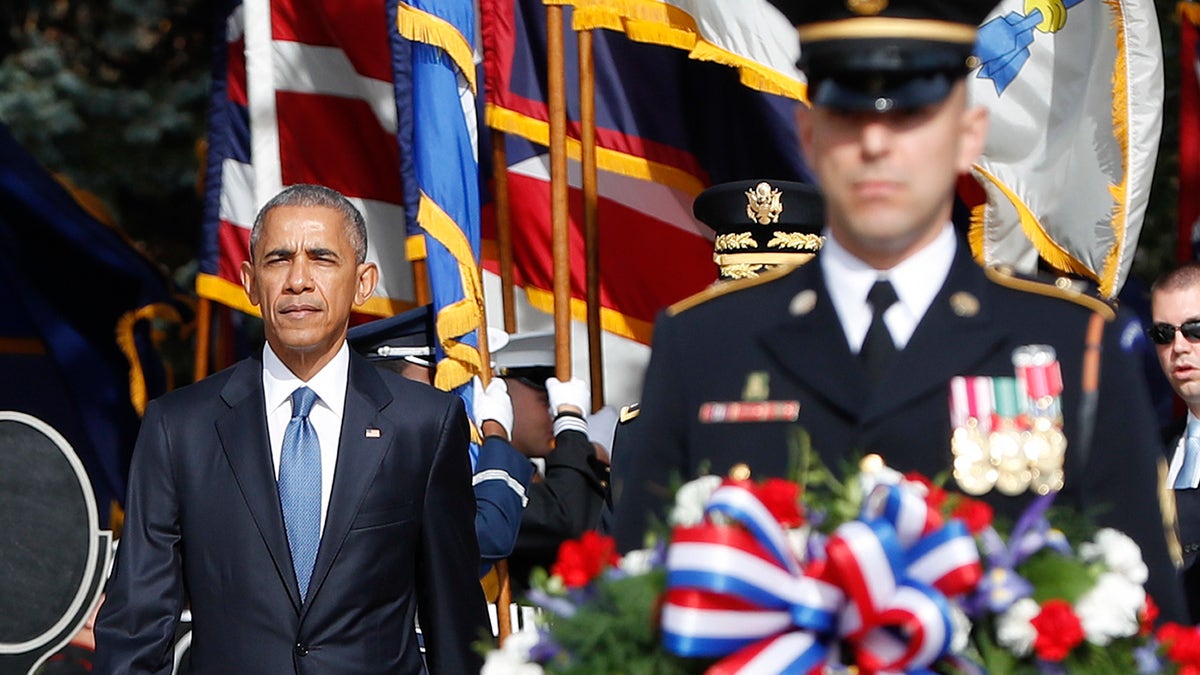
President Barack Obama arrives to lay the wreath at the Tomb of the Unknowns, on Veterans Day, Friday, Nov. 11, 2016, at Arlington National Cemetery in Arlington, Va. (AP Photo/Pablo Martinez Monsivais)
The American people are clearly tired of politicians playing politics with crucial services and responsibilities of the federal government.
As a retired military chaplain, I have seen first-hand the crucial impact of faith-based services in the military. The brave men and women who volunteer to serve our nation make incredible sacrifices, including spending long periods of time stationed far from home. When possible, servicemembers stationed abroad take their families with them. These family members also make great sacrifices, leaving behind friends, extended families, and other support systems, often while adapting to a completely different culture.
To help fortify our servicemembers and their families in the inherent challenges of their sacrifice, the military has developed extensive support structures.
These structures ensure basic necessities that civilians take for granted but would otherwise be inaccessible to servicemembers and their families—things like childcare, education, groceries, and religious support. When stationed abroad, providing for basic family needs is not as simple as enrolling your child in the local public school or attending Sunday services at the church down the street.
PRESIDENT-ELECT TRUMP'S THREE GREATEST CHALLENGES
Many people are unaware that the Department of Defense relies on contractors to provide many of these needed services. Some of these contractors are religious service providers, whose employees are motivated by their faith to serve our servicemembers where few others are willing to go and in capacities that few others are willing to fill.
It is hard to overstate the extent to which our servicemembers and their families rely on the religious support provided not just by the Chaplain Corps, but by religious service providers who contract with the military to fill specific needs on individual bases that the Chaplain Corps cannot cover on its own. These needs range from staff support for religious services, to education, to providing for unique and specific religious practices like preparing kosher and halal meals.
That is why I am so discouraged that Congress did not retain basic religious exemptions in this year’s military defense authorization bill. Without the protections that originally passed the House of Representatives, many of these services could be lost. And it will be our men in women in uniform, and their families with them, who are harmed.
The language at issue, known as the Russell Amendment, was common sense and very straightforward. It simply said that the same religious protections that faith-based organizations have had for decades under federal civil rights laws will also apply to federal contracts and grants. Congress found a reasonable solution by using existing federal law—a solution remarkably similar to one that Senate Democrats supported in a different bill in 2013.
When President Obama signed Executive Order 13672 in 2014, expanding hiring and employment protections in federal contracting, he himself retained the pre-existing religious protections. But soon after the EO was signed, unelected government bureaucrats narrowed how these protections have been generally interpreted for decades into something that is virtually useless by any measure of common sense.
The practical result? Many faith-based contractors have been forced to forego renewing and competing for contracts, and vital services that our servicemembers and their families have relied on for support are dwindling.
The Russell Amendment would have helped to restore these lost services. But as accusations began to swirl that the Russell Amendment would permit religious organizations to be discriminatory, the White House indicated that the President could veto the military’s 2017 funding bill over this provision.
Why would the president oppose—to the point of jeopardizing the entire defense bill—the same religious protections he himself retained in the EO? Why would he oppose basic religious protections that have existed in the Civil Rights Act of 1964 and the Americans with Disabilities Act for decades? Those decades of experience show that the religious protections work.
But the president played politics with our brave men and women in uniform and the protections passed by the House were stripped from the final bill, despite the fact that the president’s own administration had affirmed that faith based providers are important partners to the federal government when it comes to contracts and grants.
Relying on longstanding federal civil rights laws is not discriminatory—it’s consistent with existing federal law as well as with the president’s EO, and its the right thing to do.
Services are being lost as we debate this issue and now it is the job of the new Congress and administration to protect these services for servicemembers and their families.
Let these organizations do what they do best: serve others.
